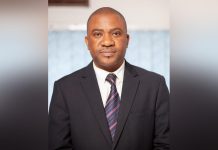Africa-Press – Malawi. Ombudsman Grace Malera has faulted the Reserve Bank of Malawi (RBM) for breaching good governance practices in the recruitment of Chief Executive Officer for its Export Development Fund (EDF), Gerald Nsomba.
The Ombudsman has described Nsomba’s recruitment as irregular. EDF is a development finance institution registered in Malawi under the Companies Act (1984) and is a wholly-owned subsidiary of the RBM.
Presenting her investigation report Friday, Malera said Nsomba was wrongly shortlisted and recruited, exposing what she called maladministration at the central bank.
“It was wrong for the Reserve Bank of Malawi to hire Nsomba after three years after doing interviews. That is contrary to government requirement,” Malera said, adding that one should get a job offer within a year after undergoing interviews.
She also said Nsomba had a post graduate diploma, which was not equivalent to a Masters Degree that was required for the job. In November last year, RBM Governor, Wilson Banda, and his team defended the hiring of Nsomba before the Public Appointments Committee (Pac), saying his recruitment followed all necessary procedures.
Among other issues, the Pac members queried why Nsomba got the job despite him not having a Masters Degree. Banda told the committee then that recruitment of the CEO was done by the EDF Board of Directors.
“Export Development Fund CEO’s recruitment went through normal procedure; it was advertised in both The Nation and Times [papers], endorsed by the board members,” Banda said.
On her part, RBM Legal Counsel, Agnes Sentala, explained to the committee how the recruitment process was done and she also defended Nsomba as having right qualifications for the job.
“The CEO has a Bachelor’s Degree in Business Administration obtained at Mubas (formerly Malawi Polytechnic), and he has Post-graduate Diploma in Trade Policy and Trade Law, which helped him to be recruited and work for two reputable regional development banks,” Sentala said.
She further argued that in matters of recruitment, experience is taken to mean practical skills and knowledge gained from actually doing something. She explained that Nsomba worked at Afreximbank, which has 53 African countries as its members and at Trade and Development Bank which has 21 African member states.
“At Afreximbank, he worked as Manager in the Intra-African Trade Initiative for three and a half years. He was recruited to participate in the establishment of the Intra-African Trade Initiative, a semi-autonomous division of the Afreximbank which seeks to promote trade and investments between and among African countries,” Sentala said.
She further said during his time, he generated and implemented transactions of around $3.1 billion in around 14 African countries which involved engagements with heads of state, cabinet ministers, central bank governors, leading industrialists and other private sector leaders.
The determination by Ombudsman comes after Nsomba left EDF. According to his LinkedIn profile, he is back at African Export-Import Bank (Afreximbank) in Cairo since February 2022.
According to the profile, he was hired at EDF in July 2020. That was after he had also worked as Manager for Intra-African Trade Initiative at Afreximbank between November 2016 and May 2020.
Among other things, the Ombudsman has directed that the EDF board should put in place a clear recruitment policy which will guide how recruitments are to be carried out within the institution. The Office of Ombudsman acted on complaints it received regarding the hiring of Nsomba.
EDF was established as a Special Purpose Vehicle with the mandate of promoting the growth of exports as a way of assisting in the realisation of national development goals of growing and diversifying the country’s exports.
EDF is also a key institution for the implementation of the National Export Strategy (Nes), specifically diversifying Malawi’s export base by focusing on non-traditional exports, increasing export revenue earnings into the country and bolstering international reserves through increased flows of foreign direct investments into export sectors.
For More News And Analysis About Malawi Follow Africa-Press






